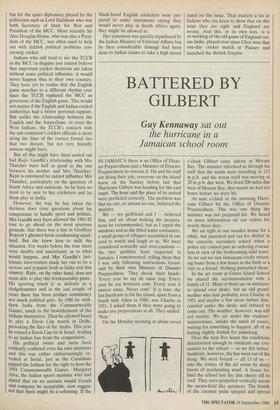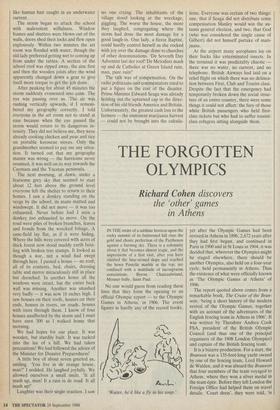BATTERED BY GILBERT
Guy Kennaway sat out
the hurricane in a Jamaican school room
IN JAMAICA there is an Office of Disas- ter Preparedness and a Minister of Disaster Preparedness to oversee it. He and his staff are doing their job; everyone on the island knew on the Sunday before last that Hurricane Gilbert was heading for the east coast. The hour and the place of its arrival were predicted correctly. The problem was that no one, or almost no one, believed the minister.
We — my girlfriend and I — believed him, and set about making the prepara- tions he recommended, but as I taped the windows and as she filled water containers, a small group of villagers assembled in our yard to watch and laugh at us. We were considered cowardly and over-cautious the two qualities least respected in Jamaica. I remonstrated, telling them that I was only following instructions broad- cast by their own Minister of Disaster Preparedness. They shook their heads: 'Every year he say de same ting. Every year he say horricon corn. Every year it swerve away. Never corn!' It is true; the last hurricane to hit the island, apart from a brush with Allen in 1980, was Charlie in 1951. I asked them if they were going to make any preparations at all. They smiled. `Non.'
On the Monday morning at about seven o'clock Gilbert came ashore at Morant Bay. The minister informed us through his staff that the winds were travelling at 115 m.p.h. and the storm itself was moving at 20 m.p.h. due west. We lived 200 miles due west of Morant Bay; that meant we had ten hours before we were hit.
At nine o'clock in the morning Hurri- cane Gilbert hit the Office of Disaster Preparedness. This was one thing the minister was not prepared for. We heard no more information on our radios for nearly three days.
We sat tight in our wooden house for a while, but panicked and ran for shelter in the concrete secondary school when a police car cruised past us ordering evacua- tion in view of the forthcoming tidal wave. As we ran we saw Jamaicans coolly return- ing home from a few hours in the bush or a visit to a friend. Nothing perturbed them.
In the art room at Green Island School we shared the accommodation with a family of 11. Most of them sat on mattress- es spread over desks, but an old grand- mother who had probably seen Charlie in 1951 and maybe a few more before him, crawled under the desks and refused to come out. The weather, however, was still not stormy. We sat under the students' watercolours, amidst the smell of roneo, waiting for something to happen, all of us feeling slightly foolish for panicking.
Over the next five hours the conditions deteriorated enough to vindicate our eva- cuation to the school — so we felt better. Suddenly, however, the fun went out of the thing. We were forced — all 13 of us into the corner of the art room by sharp bursts of accelerating wind. A house be- hind the school lost the zinc sheets off its roof. They were propelled vertically across the sports-field like sprinters. The fronds of the coconut palm splayed and spread like human hair caught in an underwater current.
The storm began to attack the school with malevolent wilfulness. Window frames and shutters were blown out of the walls, doors shed their locks and flew open explosively. Within two minutes the art room was flooded with water, though the old lady preferred getting wet to coming up from under the tables. A section of the school roof was ripped away, the zinc first and then the wooden joists after the wind apparently changed down a gear to give itself more torque to get the job done.
After peaking for about 45 minutes the storm suddenly evanesced into calm. The eye was passing over us. The air was rushing vertically upwards, if I remem- bered my geography correctly. I told everyone in the art room not to stand at ease because when the eye passed the storm would return to its dangerous in- tensity. They did not believe me, they were already cooking chicken and peas and rice on portable kerosene stoves. Only the grandmother seemed to pay me any atten- tion. It turned out that my geography master was wrong — the hurricane never resumed, it was well on its way towards the Caymans and the Yucatan peninsula.
The next morning, at dawn, under a fearsome grey sky that seemed to start about 12 feet above the ground level everyone left the shelter to return to their homes. I saw a donkey standing on the verge by the school, its mane matted and windswept. It did not move — it was too exhausted. Never before had I seen a donkey too exhausted to move. On the road were piles of broken branches, leaves and fronds from the wrecked foliage. A cane-field lay flat, as if it were hiding. Where the hills were covered with acres of thick forest now stood muddy earth brist- ling with broken tree stumps. It looked as though a war, not a wind had swept through here. I passed a house — no roof; all of its contents, bed, chairs, dressing table and mirror miraculously still in place but drenched. In another home all the windows were intact, but the entire back wall was missing. Another was smashed very badly — it was now 18 inches high. I saw houses on their roofs, houses on their ends, houses in rivers, on roads, houses with trees through them. I know of four houses unaffected by the storm and I must have seen 300 as I walked home that morning.
We had hopes for our place. It was wooden, but sturdily built. It was tucked into the lee of a hill. We had taken precautions! We had followed the advice of the Minister for Disaster Preparedness!
A little boy of about seven greeted us, smiling. `You live in de orange house, man?' I nodded. He laughed joyfully. We allowed ourselves a small smile. `It all mash up, man! It a ruin in de road. It all mash up!'
Laughter was their single reaction. I saw no one crying. The inhabitants of the village stood looking at the wreckage, giggling. The worse the house, the more they laughed, congregating where the storm had done the most damage for a good laugh-in. One lady, a fierce Baptist, could hardly control herself as she rocked with joy over the damage done to churches of other denominations. `De Seventh Day Adventist last der roof! De Metodists mash op and de Catholics at Green Island ruin, man, pure ruin!'
The talk was of compensation. On the radio politicians and commentators tried to put a figure on the cost of the disaster. Prime Minister Edward Seaga was already holding out the upturned cap in the direc- tion of his old friends America and Britain. Unfortunately, the greatest cash loss to the farmers — the imminent marijuana harvest — could not be brought into the calcula- tions. Everyone was certain of two things: one, that if Seaga did not distribute some compensation Manley would win the au- tumn general election, and two, that God (who was considered the single cause of Gilbert) did not himself partake of mari- juana.
At the airport many aeroplanes lay on their backs like exterminated insects. In the terminal it was predictably chaotic there was no water, no current, and no telephone. British Airways had laid on a relief flight on which there was no delinea- tion between First, Club and Tourist class. Despite the fact that the emergency had temporarily broken down the social struc- ture of an entire country, there were some things it could not affect: the fury of those white British passengers who held first- class tickets but who had to suffer tourist- class refugees sitting alongside them.































































 Previous page
Previous page